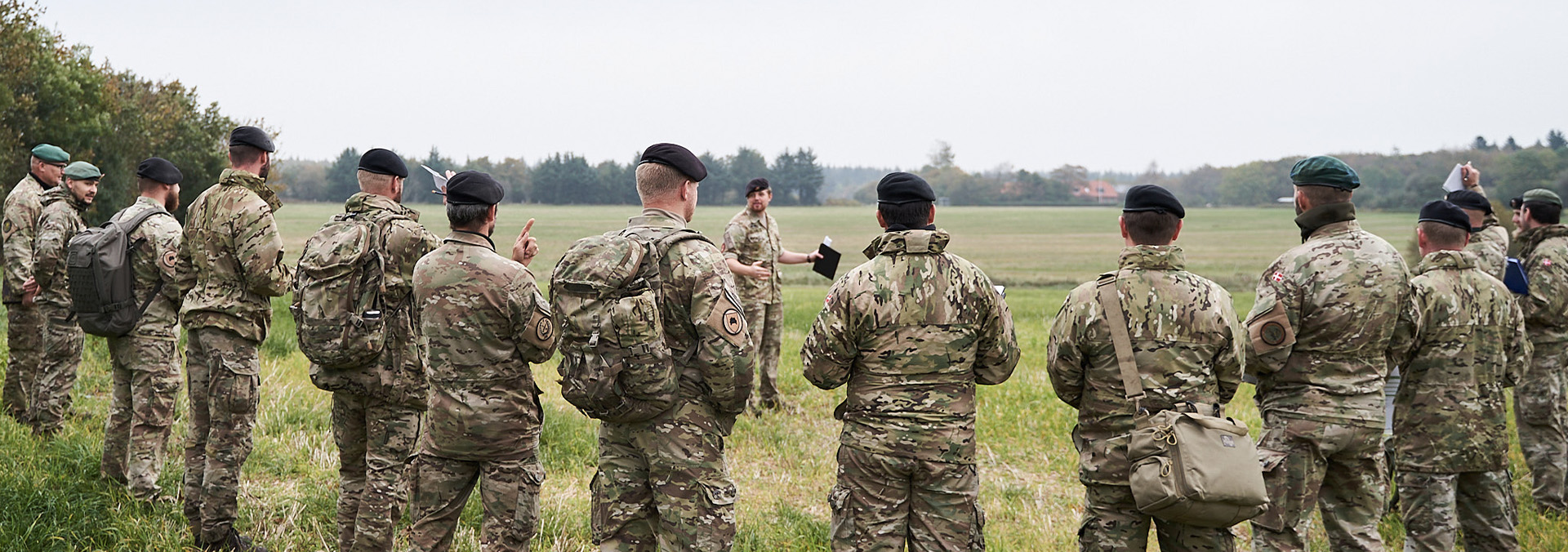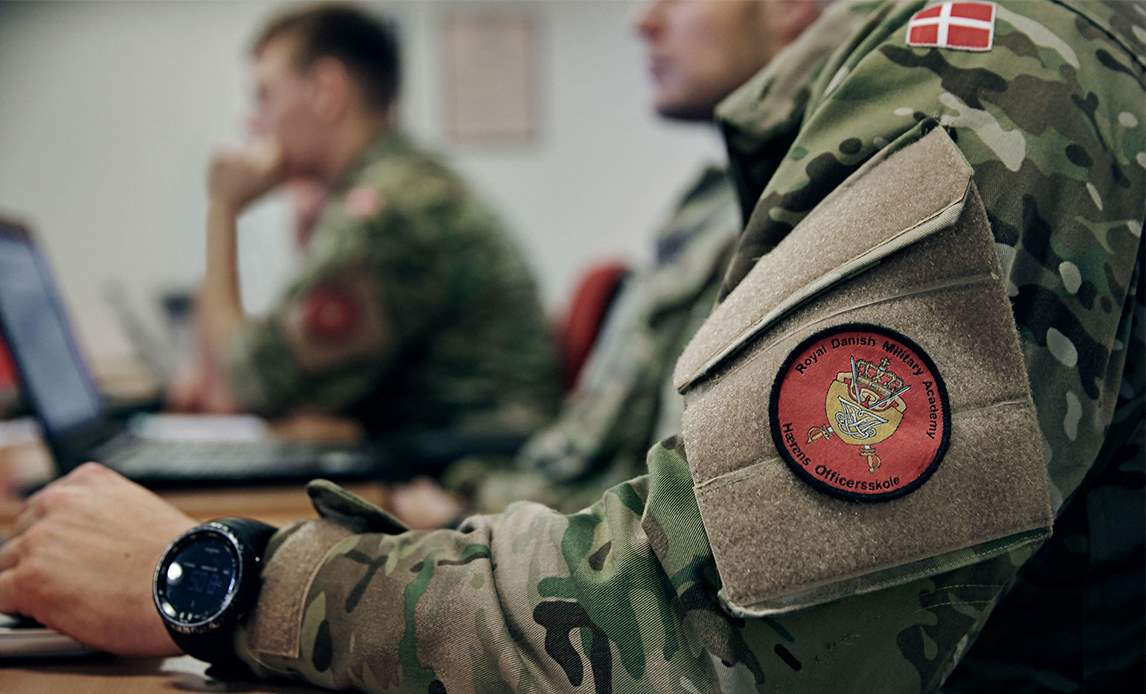Overblik
Uddannelser
Efteruddannelse
Skoler
Uddannelser
Overblik
Institutter

Med vores uddannelser sikrer vi læring og udvikling for soldaten på alle niveauer gennem hele karrieren.
Forsvarsakademiets mission er at levere den uddannelse og professionsdannelse, der sætter Forsvarets chefer, ledere og mellemledere i stand til at møde såvel Forsvarets umiddelbare udfordringer, som Forsvarets langsigtede kendte og ukendte militære udfordringer, så Forsvaret kan vinde på fremtidens kampplads.

Forsvarsakademiet er i 2026 vært for NORDICADL, en international konference afholdt i NORDEFCO-regi, som samler militære praktikere, undervisere og forskere med fokus på læring og uddannelse i en nordisk forsvarskontekst.

På Hærens Officersskole arbejder vores professionelle og kamperfarne lærere og holdførere benhårdt for uddanne og udvikle dig til at blive en dygtig officer i Hæren, men i Hæren bidrager vi alle til opgavens løsning. Som kadet har du derfor også et stort ansvar for, at du og dine kammerater på årgangen lykkes; nemlig ved at være velforberedt, velmotiveret og positiv.
På Forsvarsakademiet uddanner vi officerer til at løse Forsvarets unikke opgaver. Officersuddannelserne hviler på et stærkt fagligt vidensgrundlag med fokus på den militære profession.
Løjtnantsuddannelsen i Forsvaret er en af mest populære uddannelser, hvor du ikke bare bliver uddannet til leder, men også får praktisk ledererfaring undervejs.
Uddannelsen til sergent giver dig de nødvendige pædagogiske og faglige forudsætninger for at kunne lede en gruppe soldater i mange forskellige miljøer, samt fungere som instruktør og underviser.
Kandidat i Statskundskab fra Aarhus Universitet og fuldmægtig ved Sektion for Sikkerhedssamarbejde, Institut for Strategi og Krigsstudier.
Ph.d. i Filosofi fra the Department of War Studies på King’s College London og lektor ved Center for Værnsfælles Operationer, Institut for Militære Operationer.

På Forsvarsakademiet har vi over 600 militære og civile medarbejdere flere steder i landet.
Forsvarets uddannelsesstrategi danner rammen for en bred portefølje af lærings- og uddannelsesaktiviteter, herunder grund-, videre- og efteruddannelser. Forsvarets uddannelsesstrategi fastlægger de overordnede pejlemærker for videreudviklingen af Forsvarets uddannelser ud fra bærende principper for relevans, kvalitet og fleksibilitet.
Vi bruger cookies til at indsamle statistik og vise feeds fra sociale medier. Nedenfor kan du læse om de forskellige cookies. Du kan klikke 'Kun nødvendige', eller vælge hvilke du vil acceptere. Du kan til hver en tid ændre dit samtykke ved at klikke på det lille cookie-ikon i venstre side.
Læs mere om cookiesNødvendige (vis detaljer)
Systemcookies | Nødvendige
Intern statistik (vis detaljer)
Siteimprove
Tredjeparts (vis detaljer)
Facebook | x | Google
Der findes enkelte cookies, som er nødvendige for at hjemmesidens system kan fungere. Ønsker du helt at udelukke muligheden for at der sættes cookies, skal du derfor slå cookies fra i din browser.
Navn: ASP.Net_SessionId og volumeControl_volumeValue
Udbyder: Systemcookies
ASP.Net_SessionId er en cookie, som bruges til at identificere brugerens session på web-serveren. Sessionen er et område på serveren, som kan bruges til at gemme sessionstilstand mellem http-anmodninger.
Udløb: Når sessionen udløber
Privatlivs politik: Vores cookiepolitik
Navn: necessaryCookie og cookiebanner
Udbyder: Nødvendige
NecessaryCookie sættes for at markere accept af nødvendige cookies.
Cookiebanner sættes for at gemme cookieindstillingerne.
Udløb: 30 dage
Privatlivs politik: Cookiepolitik
Siteimprove webanalyse-program opsamler en generel besøgsstatistik på vores hjemmeside. Vi har slået IP-anonymisering til. Det betyder, at din IP-adresse slettes med det samme efter den læses. Din IP-adresse kan dermed hverken spores eller genskabes i vores system. Statistikken anvendes udelukkende i opsummeret form, fx til at se hvor mange besøgende vi har, og hvilke sider der er mest besøgte.
Navn: nmstat og AWSALBCORS
Udbyder: Siteimprove
Disse cookies bruges kun under det aktuelle besøg. Der indsamles udelukkende ikke-personlig information omkring hvilke undersider der besøges. Formålet er at følge, hvor mange besøgende vi har, og hvilke sider der er mest besøgte.
Udløb: Op til 1.000 dage, men oftere kortere afhængig af browser.
Privatlivs politik: Siteimproves information
Vi bruger dele-funktion til sociale medier, men du skal være opmærksom på, at du teknisk set forlader fak.dk og er omfattet af det sociale medies datapolitik, når du klikker på det. Der står en advarselstekst om dette ved funktionen.
Vi benytter også feeds og kort fra andre medier enkelte steder på fak.dk, men har valgt kun at vise elementerne for de brugere, der accepterer cookies fra tredjepart. Du skal derfor være opmærksom på, at der kan være elementer på hjemmesiden, der ikke fungerer, hvis du siger nej til cookies fra tredjepart.
Navn: Facebook
Udbyder: Facebook
Facebook datapolitik:
Denne politik beskriver de oplysninger, vi behandler for at understøtte Facebook, Instagram, Messenger og andre produkter og funktioner, der tilbydes af Facebook (Facebook-produkter eller produkter). Du kan finde flere værktøjer og oplysninger i Facebook-indstillingerne og Instagram-indstillingerne.
Udløb: Cookien udløber om 30 dage
Privatlivs politik: Facebook datapolitik
Navn: X
Udbyder: x
X s brug af cookies og lignende teknologier:
Vores tjenester bruger cookies og andre lignende teknologier, såsom pixels eller lokal lagring, til at hjælpe med at give dig en bedre, hurtigere og sikrere oplevelse. Her er nogle af de måder, hvorpå vores tjenester, herunder vores forskellige websteder, SMS, API'er, e-mail-meddelelser, applikationer, knapper, widgets og annoncer, bruger disse teknologier: at logge dig ind på Twitter og Periscope, gemme dine præferencer, tilpasse det indhold, du ser, beskytte mod spam og misbrug og vise dig mere relevante annoncer.
Udløb: Cookien udløber om 30 dage
Privatlivs politik: Twitters cookiepolitik
Navn: Google Maps
Udbyder: Google
Googles privatlivspolitik:
Når du bruger vores tjenester, betror du os dine oplysninger. Vi forstår, at det er et stort ansvar og arbejder hårdt på at beskytte dine oplysninger og give dig kontrol over dem.
Denne privatlivspolitik er beregnet som en hjælp til at forstå, hvilke oplysninger vi indsamler, hvorfor vi indsamler dem, og hvordan du kan opdatere, administrere, eksportere og slette dine oplysninger.
Læs mere hos udbyderen.
Udløb: Cookien udløber om 30 dage
Privatlivs politik: Google privacy policy